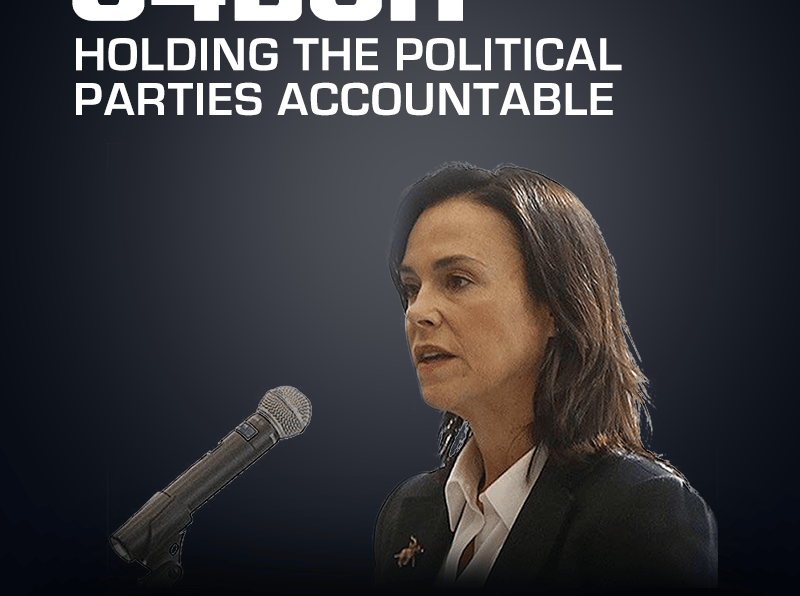Holding the Political Parties Accountable
FEATUREDACTIVISM


Restoring Accountability and Ethics to the ORP: Why Using Party Funds for Personal Gain Undermines the Political Will of Ohio Republicans and How Educating Citizens about the Significance of Central Committees is Key to a More Accountable Political System.
In his quest for the Governorship of Ohio, John Kasich employed a strategy of raising funds to secure the election of State Central Committee members who were sympathetic to his cause. This tactic enabled him to replace the then-sitting Chairman, Kevin DeWine, with his preferred choice, Matt Borges. Unfortunately, during Borges' tenure, he implemented a policy of using party funds earmarked for candidate elections to support the election of State and County Central Committee members favorable to Kasich. This approach was frowned upon previously but became commonplace under Borges' leadership.
By 2010, Kasich's political stance had undergone a radical shift from a center-right perspective to a center-left position. As a result, Tea Party activists and conservatives united in their bid to elect more conservative members to the Ohio Republican State Central Committee to better represent the majority of Ohio Republicans. However, Borges, handpicked by Kasich as the party chair, waged a war against the Tea Party and ensured that Tea Party-friendly candidates did not win by using party funds to campaign against them.
Regrettably, many Ohioans are unaware of the role of political Central Committees, leading to a lack of political outcry. This situation is worsened by the party and political leadership's deliberate attempt to keep Ohioans in the dark about the political process. Consequently, this creates a political establishment that does not reflect the will of the people but instead reflects the will of the political elites within the party.
To address this issue, we propose common-sensical policies that will bring accountability to registered Republicans instead of the political elites. It is crucial to educate people about the significance of political Central Committees in schools and universities. Additionally, party leadership must cease diverting funds from political candidates to support members sympathetic to their cause. We believe that using party funds for such purposes is unethical and immoral.
Moreover, the Republican Party (Central Committee) has eliminated the ability to contact State Central Committee members from the Republican website, and the Ohio Secretary of State has refused to make the current elected members' modern contact information readily available. We urge all Ohioans to contact State Central Committee members to restore accountability to registered Republicans.
In conclusion, we believe that these policies are essential to achieve a political establishment that reflects the will of the people and promotes accountability. We have an incomplete list of State Central Committee members, and we welcome any updated information. By advocating for these policies, we can create a political system that serves the people of Ohio and empowers them to take charge of their political destiny.
Our political stance advocates for the passage of legislation that grants voters the option of "None of the Above" on all primary ballots for State officeholder races and some county offices and judges. This measure is vital to reinforce the fundamental principle of American democracy, which is the consent of the governed. To exercise this fundamental right, the option to withhold consent through a "None of the Above" choice is crucial.
If the "None of the Above" option receives the majority of votes, a special election will be triggered in 90 days. This process repeats itself as many times as necessary until a candidate achieves a clear majority. Furthermore, candidates who lost to the "None of the Above" option in the initial election are not allowed to compete in the special election, ensuring that voters have a genuine opportunity to choose suitable representatives.
Our proposal aims to foster accountability among political parties and their candidates. The people have the power to send a message to their parties through this system. Poor candidates who fail to meet the expectations of voters will be held accountable, and parties will have to rethink their candidate selection process to avoid future embarrassment.
To fully exercise their right to consent, voters must be provided with a genuine choice. Not voting cannot be equated with withholding consent as it simply allows others to make decisions on one's behalf. By introducing a "None of the Above" option, voters can exercise their right to withhold consent by rejecting all candidates, thereby compelling parties to offer better options.
Our proposal is grounded in the principles of democracy and good governance. It promotes fair and credible elections, fosters accountability, and empowers citizens to exercise their right to consent. Therefore, we urge lawmakers to pass legislation that provides voters with the option of "None of the Above" on all primary ballots for State officeholder races and some county offices and judges.
Revolutionizing Democracy: The Case for 'None of the Above' Option on State Officeholder Races and County Offices
In a democratic society, the representation of the people's voices is crucial for the success of the political system. County and State Central Committee members hold a significant responsibility in representing the will of registered party members in their respective precincts. However, there have been instances where these elected officials are unresponsive and unavailable to their constituents, leaving them with limited means to contact their elected members, with only postal mail as an option.
To ensure that the voices of the people are not silenced, we advocate for the passage of legislation that would require County Central Committee members to maintain publicly available and active email addresses and phone numbers to retain their seats. This legislation would ensure that County Central Committee members are accessible and accountable to their constituents, and the concerns and opinions of the people are heard and addressed.
Through this legislation, constituents will have a more direct line of communication with their elected officials, and elected officials will be held to a higher standard of responsiveness and accountability. By promoting the availability of email and phone communication, we can strengthen the democratic process and ensure that elected officials are fulfilling their responsibilities to the people they represent.
Advocating for Public Accessibility: Requiring Active Contact Information for County and State Central Committee Members
In the political arena, public statements made by the State Chairman can significantly impact a candidate's chances of success. Negative comments from the Chair can severely hinder a candidate's fundraising efforts and jeopardize their prospects for re-election. Such behavior runs counter to the mission and objectives of the party. However, if a candidate or officeholder's actions are deemed unacceptable, State Central Committee Members must have the power to address the situation promptly. To that end, we propose that the authority of the Chair to admonish a candidate should be explicitly stated in the form of reprimand, censure, or termination. This would provide a clear mechanism for the party to hold members accountable and ensure that the Chair's actions are aligned with the party's goals and values.
